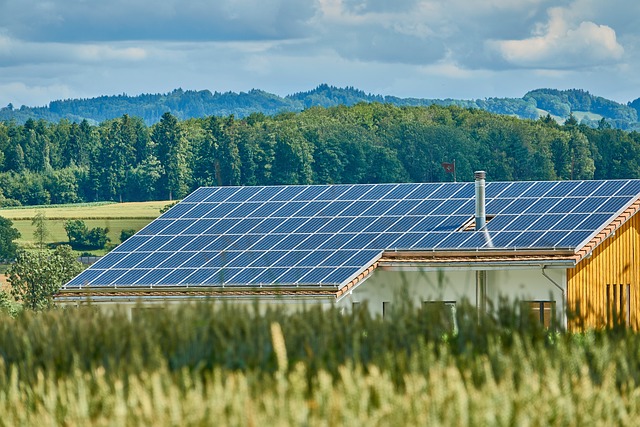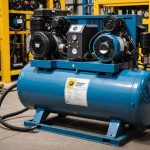Commercial solar panels transform energy expenses into long-term savings while shrinking carbon footprints. Tailored for businesses, these systems ensure reliable power, enhance sustainability, and boost ROI through proven efficiency and generous warranties. Real-world installations—from farms to universities—demonstrate how smart solar investments deliver measurable benefits and safeguard future energy needs. Understanding their design, costs, and financing reveals why commercial solar is a strategic asset for forward-thinking enterprises.
Understanding Commercial Solar Panels: Overview and Key Benefits
Commercial Solar Panels are vital to sustainability strategies for businesses, offering a renewable energy solution to lower operational costs. These panels are designed specifically for large-scale applications, distinguishing them from residential systems by their size, capacity, and durability.
Also read : Your go-to rendering and building supplier for quality solutions
The main advantages include significant cost savings—reducing electricity bills—and a decrease in carbon footprints through cleaner energy. Additionally, commercial solar offers energy independence, shielding businesses from volatile grid prices and future energy cost hikes.
Compared to residential systems, commercial solar panels typically feature higher wattages, greater efficiency, and longer warranties, accommodating the energy demands of larger premises. Companies like Geo Green Power have installed extensive systems (e.g., farms, factories, schools) demonstrating substantial financial and environmental benefits.
In parallel : Unforgettable memories with a provence wedding photographer
Types and Technologies of Commercial Solar Panels
Monocrystalline vs. Polycrystalline Solar Panels
Monocrystalline solar power systems for businesses are recognized for high energy yield and superior efficiency, often surpassing 20% under optimal conditions. These solar panel technology trends for enterprises result in slightly higher costs but deliver durability ideal for commercial photovoltaic installations requiring maximum roof output. Polycrystalline options, while less efficient (typically 15-17%), present a lower initial investment and can be suitable for larger rooftops with fewer space constraints. Both types serve diverse business requirements but monocrystalline panels excel in urban solar projects where space and output maximization matter most.
Advanced Commercial Solar Panel Technologies
Efficiency gains define current solar panel technology trends for enterprises. High-efficiency solar power systems for businesses now feature bifacial modules—capturing sunlight from multiple sides—and smart solar tracking systems that adjust panel angles throughout the day. These advances dramatically boost commercial photovoltaic installations’ energy harvest, improving business solar power ROI calculation. Such innovation strengthens the financial case for upfront investment in solar power systems for businesses by reducing payback periods.
Selective Panel Material Types and Their Use Cases
Silicon dominates commercial photovoltaic installations, delivering proven longevity and consistency. Emerging materials, such as cadmium telluride and perovskite, offer lightweight builds and flexible designs for novel solar power systems for businesses. Material selection is closely linked to environmental standards and solar panel technology trends for enterprises, with each type affecting overall panel durability, output, and green building compliance.
Installation Process, Costs, and Planning Considerations
Site Evaluation and System Design
Solar panel installation companies begin with a detailed site evaluation. This often involves energy audits and site assessments to determine the business’s current energy consumption and the potential for energy savings. The system design is tailored by analysing roof space, shading, and energy use patterns. This enables customization of solar power systems for businesses—ensuring the commercial photovoltaic installations are optimally sized for both immediate needs and long-term growth. Commercial solar energy solutions must align efficiency with practical limitations, factoring building orientation and potential expansion into the layout.
Typical Costs and Budgeting
The cost analysis of solar systems for businesses reveals considerable variation. For commercial solar energy solutions between 5 kWp and 500 kWp, installation costs typically range from £45,000 up to £3 million. Pricing is influenced not just by size, but by roof type, structural complexity, system components, and performance warranties. Larger solar power systems for businesses may benefit from economies of scale, reducing cost per kWp. Businesses seeking energy-efficient commercial roofing should budget for both hardware and expert installation, integrating these costs into their broader energy management plan.
Regulatory Approvals and Permitting
Navigating commercial solar panel permits and regulations is essential. Most roof-mounted commercial photovoltaic installations fall within permitted development if they meet set height and setback limits. However, solar panel installation companies must ensure compliance with local regulations, building codes, and environmental standards. Obtaining necessary permissions, especially in protected areas or for listed buildings, involves submitting documentation and, at times, undergoing detailed planning reviews. Adhering to these frameworks allows businesses to progress smoothly and avoid unexpected project delays.
Financial Incentives, Tax Benefits, and Financing Options
Government Incentives and Rebates
Commercial solar incentives and rebates remain a central strategy for UK businesses lowering upfront costs. Current schemes such as the Renewable Heat Incentive (RHI), enhanced capital allowances, and simplified grants significantly reduce the initial capital needed for large-scale solar power systems for businesses. These commercial solar incentives and rebates typically allow companies to offset a portion of their investment through direct payments or tax relief, making commercial photovoltaic installations more financially accessible. The availability of these financial tools means energy-efficient commercial roofing can quickly transition from a planned upgrade to a yield-positive asset.
Tax Benefits and Asset Financing
Tax benefits for business solar projects, including capital allowances and VAT reductions, support the affordability of commercial photovoltaic installations. Businesses can deduct the total cost of their solar investment from taxable profits using the Annual Investment Allowance (AIA). Lease arrangements for solar power systems for businesses further spread costs and simplify budgeting, with leasing vs buying solar for businesses offering a flexible alternative to outright purchase. Such tax benefits for business solar projects can accelerate payback and improve commercial building energy consumption reduction.
Funding Opportunities and Custom Financing Solutions
Solar financing options for companies are crucial to increasing adoption rates for commercial solar energy solutions. Business loans, government-backed loan schemes, and tailored commercial solar incentives and rebates can be combined to match each company’s cash flow and sustainability goals. Whether accessed directly or via solar panel installation companies, these solar financing options for companies are designed to provide manageable monthly payments while maximizing the benefits of commercial photovoltaic installations.
Operational Maintenance, Monitoring, and System Performance
Maintenance and Servicing Practices
Maintenance of commercial solar arrays is fundamental for reliable energy production and optimal asset longevity. Most commercial photovoltaic installations require annual preventive inspections, ensuring all connections, mounting structures, and electrical systems remain in excellent condition. Cleaning solar panels annually improves solar panel efficiency in commercial settings, as dirt and debris can obstruct energy capture. Troubleshooting is also necessary to promptly identify performance anomalies—common issues include module shading, inverter faults, or loose electrical connectors.
Monitoring and Performance Optimization
Solar power monitoring tools for companies are indispensable in managing large scale solar energy systems. Modern solutions provide real-time data on energy yield and help identify underperformance quickly. These tools offer granular analysis, allowing businesses to optimize usage and rapidly address operational concerns. Remote alert systems notify facility managers of irregularities, while performance analytics facilitate long-term efficiency improvements and guide maintenance of commercial solar arrays.
Warranty and Expected Lifespan
Panels typically come with a commercial solar panel warranty and lifespan of at least 25 years, while inverters carry a minimum 2-year warranty. Reputable systems retain around 85% efficiency at year 25 due to slow solar panel degradation rates in commercial use. Most solar power systems for businesses will continue producing energy beyond their official warranty period, with prolonged value in reducing operational costs.
Regulatory Compliance, Planning, and Best Practices
Planning Permission and Building Regulations
Commercial solar panel permits and regulations are guided by government and local authority rules. Roof-mounted systems that remain within “permitted development” thresholds—such as a maximum 200mm protrusion above roof level—typically do not require additional planning permission. Stricter applications apply for listed buildings or sites in protected landscapes like Areas of Outstanding Natural Beauty (AONB), necessitating tailored assessments and formal applications. Clear understanding of commercial solar industry regulations from the outset saves time and resources.
When designing commercial photovoltaic installations, building regulations addressing load bearing, fire safety, and system integrity must be met. Professional guidance ensures that the best energy-efficient commercial roofing solutions are selected to fit both site and regulatory demands.
Site and Safety Regulations
Adopting best-in-class safety protocols during installation is essential. Commercial solar panel permits and regulations require certified professionals who are NICEIC, ISO, or MCS accredited. This standard guarantees electrical safety and full compliance with commercial solar industry regulations, protecting site workers and the public alike throughout each project phase.
Project Management and Implementation Best Practices
Commercial solar project management best practices begin with selecting seasoned solar panel installation companies. Collaborating closely with architects, contractors, and authorities ensures that commercial photovoltaic installations progress without obstacles, maintaining timelines and budgets. Transparency and adherence to commercial solar industry regulations at every step support the highest return on investment for businesses seeking sustainable energy solutions.
Conclusion: Strategic Value of Commercial Solar Panels for Businesses
Businesses seeking commercial solar energy solutions can expect immediate and enduring rewards. Installing solar power systems for businesses sharply reduces operational expenses, with onsite electricity costing a fraction of current grid rates. This leads to rapid return on investment and sustained savings, even as grid prices climb.
The benefits of solar energy in businesses extend beyond financial gains. Lowering commercial building energy consumption dramatically cuts carbon emissions, reinforcing environmental responsibility and empowering progress toward sustainability targets. Long-term system warranties, often lasting 25 years, assure consistent output and reliability for commercial photovoltaic installations.
Adopting energy-efficient commercial roofing with large scale solar energy systems future-proofs operations. Businesses can benefit from available commercial solar incentives and rebates, minimizing installation outlay. Additionally, streamlined integration of solar power systems for businesses means minimal disruption, while commercial solar panel warranty and lifespan secure continuing value.
Commercial solar energy solutions support net metering for commercial solar setups and the opportunity to export surplus electricity, establishing extra revenue streams. By leveraging tailored commercial solar energy solutions, organizations signal their commitment to environmental stewardship and future-proofed financial planning—encouraging a thorough evaluation of energy needs and available options with skilled solar providers.
Maximizing Value: Commercial Solar Energy Solutions and Return on Investment
Precision: Commercial solar energy solutions help businesses minimize electricity expenses and reduce reliance on grid power, primarily by leveraging solar power systems for businesses that generate energy onsite during peak usage hours.
Businesses integrating commercial photovoltaic installations enjoy an average payback period of three to five years, with large-scale systems potentially seeing faster returns when financial incentives are utilized. Many UK companies experience reductions of over 80% on their daytime unit electricity costs, making the business case for solar compelling even before considering additional solar financing options for companies or tax benefits for business solar projects.
Understanding the cost analysis of solar systems for businesses is crucial, as installation prices range from £750 to £1,000 per kWp, significantly less than the average grid cost per kWh. Typical installations, such as a 100 kWp system, require an upfront investment of £75,000 to £100,000, with larger commercial solar energy solutions delivering stronger economies of scale.
Solar panel installation companies certified for quality and safety standards manage the process, ensuring that the system design fits both current and future business needs. Importantly, commercial solar panel warranty and lifespan safeguards ensure ongoing performance and a long operational duration, helping businesses confidently adopt solar technology as part of their sustainability initiatives.











